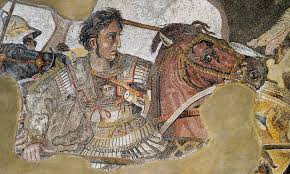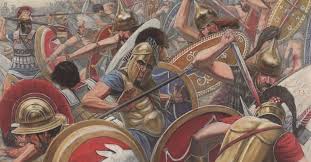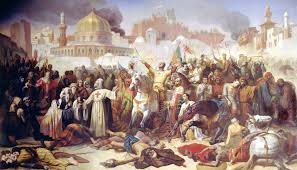Vaša košarica je trenutno prazna!
Kategorija: Timeline Stories
-

Birth of Alexander the Great On July 20th, 356 BC, one of history’s most influential figures, Alexander the Great, was born in Pella, the capital of the ancient kingdom of Macedon. His father was King Philip II, a brilliant military strategist who laid the groundwork for his son’s future conquests. From a young age, Alexander…
-

The Battle of the Allia On July 19th, 390 BC (traditional date), a devastating battle took place between the Roman Republic and the Senone Gauls, led by Brennus, near the Allia River. This engagement resulted in a catastrophic defeat for the Romans, who were significantly outnumbered and outmaneuvered. The Roman army suffered heavy losses, leading…
-

Great Fire of Rome (64 CE) On July 18th, 64 CE, the Great Fire of Rome erupted, beginning in the merchant shops around the Circus Maximus. The fire quickly spread, fueled by strong winds and the narrow, winding streets of the city. For six days and seven nights, the flames devastated the ancient city, consuming…
-

179 CE: The Eruption of Mount Vesuvius While the exact date is debated among historians, a strong tradition places the catastrophic eruption of Mount Vesuvius on July 17th, 79 CE. This natural disaster famously buried the Roman cities of Pompeii and Herculaneum under layers of volcanic ash and pumice. The suddenness and immense scale of…
-

Beginning of the Islamic Calendar (Hijra) July 16, 622, marks the approximate beginning of the Islamic calendar, also known as the Hijri calendar. This date is symbolically associated with the Hijra, the migration of the Prophet Muhammad and his followers from Mecca to Medina. While the actual departure from Mecca occurred in late June, the…
-

The Death of Julius Caesar’s Son, Caesarion (30 BC) On July 15th, 30 BC, Caesarion, the son of Julius Caesar and Cleopatra VII of Egypt, was reportedly executed on the orders of Octavian (later Emperor Augustus). His death marked a pivotal moment in the power struggles that followed Caesar’s assassination. Octavian viewed Caesarion as a…
-

The Storming of the Bastille (1789) The Storming of the Bastille on July 14, 1789, marked a pivotal moment in the French Revolution. This act of defiance against royal authority became a symbol of the uprising against the Bourbon monarchy. An angry mob of Parisian citizens, fueled by widespread discontent and a desire for arms,…
-

1793 – Assassination of Jean-Paul Marat (Paris, France) On July 13, 1793, radical journalist and revolutionary Jean-Paul Marat was assassinated in his bathtub by Charlotte Corday. Marat was a prominent figure during the French Revolution, known for his inflammatory writings in “L’Ami du peuple” (The Friend of the People). Corday, a Girondist sympathizer, believed Marat…
-

1691 – Battle of Aughrim (Ireland) This battle was the decisive engagement of the Williamite War in Ireland, fought between the Jacobite army loyal to James II and the forces of William III. Williamite forces, led by Godert de Ginkell, secured a victory that significantly weakened the Jacobite cause. It’s considered one of the bloodiest…
-

1302: Battle of the Golden Spurs On July 11th, 1302, the Battle of the Golden Spurs (Guldensporenslag) unfolded near Kortrijk, Flanders, marking a pivotal moment in medieval warfare. In this remarkable engagement, a determined Flemish militia, primarily composed of urban craftsmen and peasant foot soldiers, achieved a stunning victory. They decisively defeated a heavily armed…
